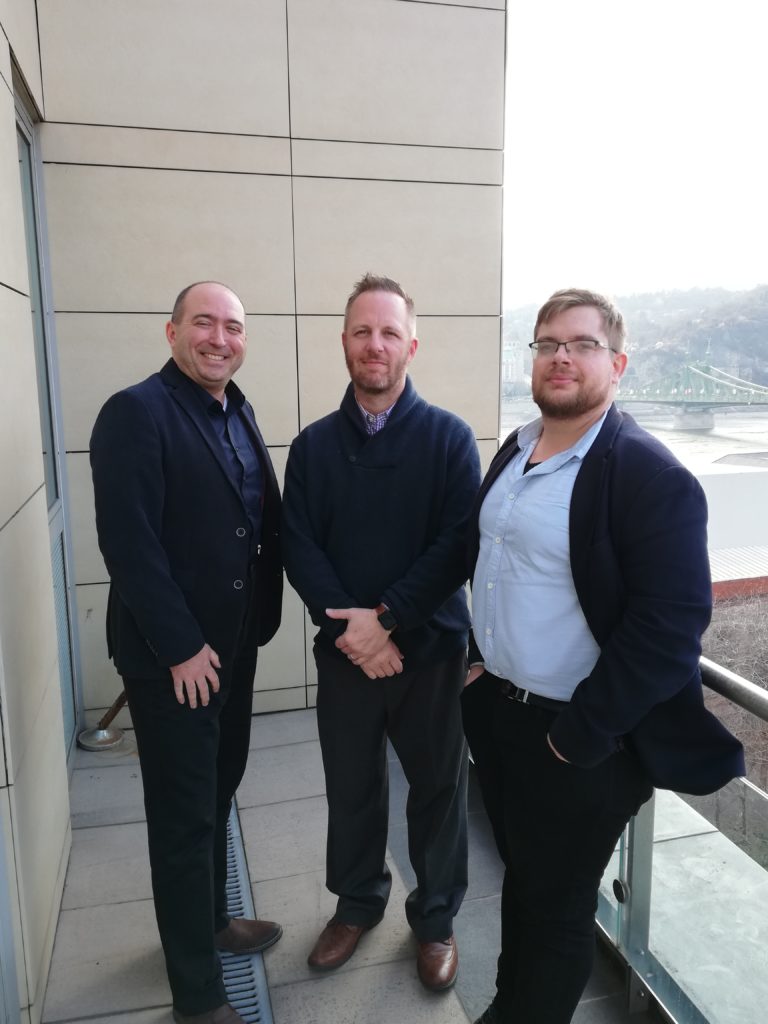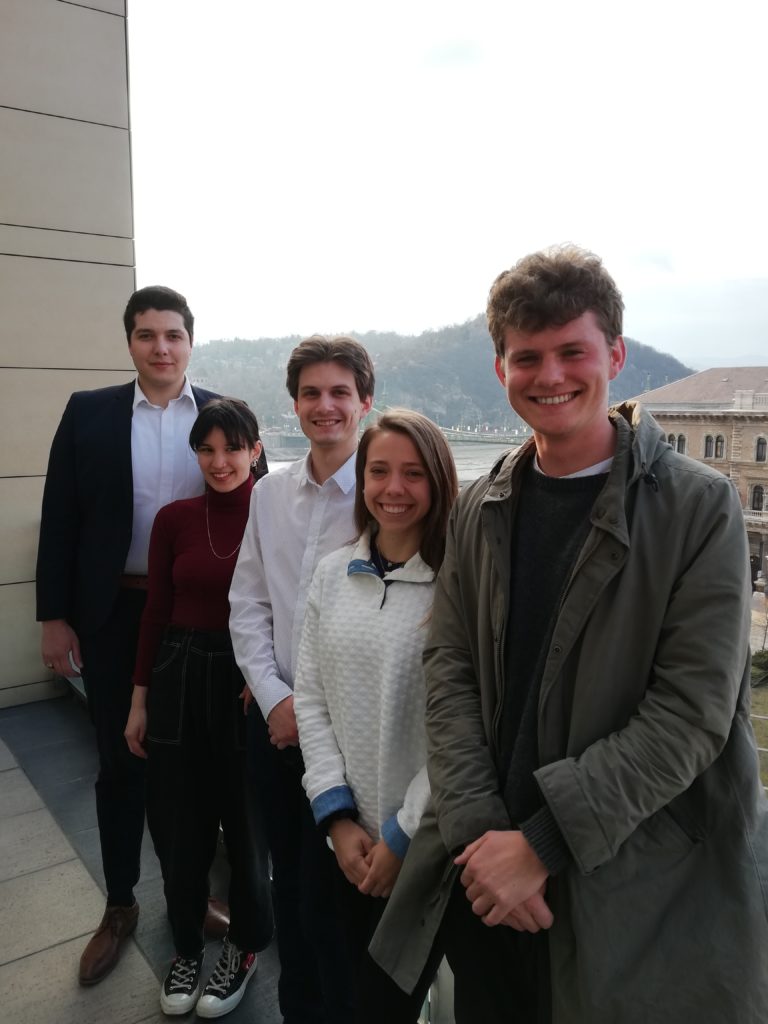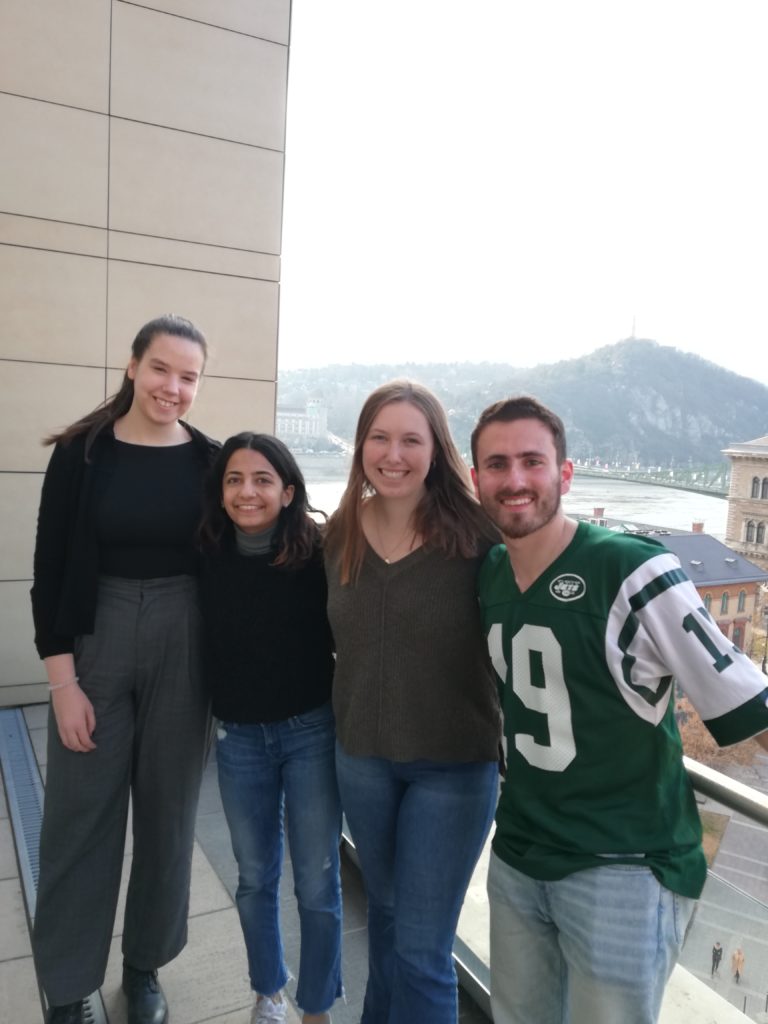When the Corvinus style meets the American style – Joint case competition course of Corvinus and the University of North Carolina

The International Business Project is run by Miklós Kozma, Bence Pistrui (Business Economics Institute) and Michael Meredith, lecturers from Corvinus University and the University of North Carolina, respectively.
It is a free elective course to which students with the appropriate backgrounds are invited; the candidates must have extensive experience in solving business case studies. The lecturers select the competitors from multiple BA programmes to ensure diversity in the teams. A Hungary-based company, most likely a start-up, is asked to work as a corporate partner each year. Their role is to provide a live case with a specific strategy-related problem the students can work on.
The initiative connects students across borders, even continents, offers them a practical skillset that perfectly complements their BA studies along with helping them enter the labour market more confidently and focused. UNC has a long tradition of doing company visits, but as Michael Meredith stated, “many students said that the company visits are great, but they didn’t feel like they were building any sort of real relationships or depth with the representatives. So, I wanted to do something different where we had the opportunity to do fewer company visits and more concentrated experience with one company”. According to Miklós Kozma, this is a special programme because “it builds on all the case-solving courses in our BA programmes since we work online before our American friends come over to Budapest and add the personal touch as well as the social element to the experience. I think it’s a great step forward to us, the organizers and to the students who had already been heavily involved in the case-solving world within Corvinus when they joined the course”.
Each year the lecturers monitor how the participants respond to the challenges and use the observations to improve the course. They continuously added, tweaked and experimented with ways to make the competition even more impactful. Emma Mcelroy (Business Administration) emphasized that “the hands-on business experience through the case competition helps me to explore the area of consulting, while I also get to grow my skills with interpersonal development and cross-cultural teamwork”.
Both the Corvinus and the UNC students came into this project with a well-established theoretical knowledge and the willingness to prove themselves. Lili Sarkadi-Nagy (Applied Economics) found it pleasantly surprising how well they could help each other achieve their common goal, which was to finalise a project they are all satisfied with. According to her, people management is an important skill that everybody should learn. Each team brought different perspectives to the table, but the most crucial element is to always be ready to ask questions. “A lot of our assumptions, what we know to be normal are challenged here. We have to assume that things might be different and ask a lot of questions. I feel that from every interaction, I can learn something just by asking more and more questions,” said Alex Mazer (dual major in Business Administration and Exercise and Sports Science, and an Incoming Associate Consultant at Bain & Company). Norbert Salavecz (Business Informatics) added that working in an international team has several advantages. “I love competing and getting to know other teams; it’s one of the best things in the world. Also, learning English is crucial in this world and during this course, we have the opportunity to speak with native speakers.”

This year, the course started on 16 January, with the first few weeks online, then in March the UNC students travelled to Budapest to work on the projects in person with their Hungarian peers. Emma found it beneficial that they were finally able to sit down at a table together and start working on finalising the project, putting ideas to paper. The teams spent weeks building their presentation over virtual sessions, but during that period they didn’t necessarily know what the end result was going to look like.
Richárd Szabó (International Business Economics) voiced that during the online sessions, they “had lectures where the Hungarians showed the Americans the ‘Corvinus style’, and the Hungarians also got to learn the ‘American style’ of case-solving”. Since January, the students had to overcome cultural differences as well as differences in the approach to solving a case. Nupur Shah (Business Administration) observed that the Corvinus style is a little more in detail and analytical. At the same time, students from UNC tend to think more broadly rather than closely follow the frameworks. From these two methods, they could create one ‘perfect’ workflow. “Corvinus students help us keep our analysis very structured, in addition to UNC students being able to think outside of the frameworks.”
However, the anticipated cultural shock never came; what struck both teams was how not different they actually are. Nupur “was expecting social cues to be really different, for there to be a lot of little things that we don’t pick up. But it was exciting to realise how similar we are. For example, if I am sarcastic, my Hungarian teammates also get it instantly”.

It was essential to Norbert to spend quality time with the American students besides working incessantly. “We talked a lot and walked each other through the conflicting social aspects we could think of. For example, we agreed that Americans are more likely to live from one day to another, while Europeans prefer to own the properties and goods.” The students all emphasized how social gatherings contribute to breaking the ice. The American participants got to experience Budapest from the historical side thanks to guided tours but also learn from their student hosts and get their perspectives on the city.
To the US students, being a part of a university is a huge aspect of their social lives, and they take their universities with them even after graduation. That’s why being a senior at UNC is also a big part of Emma’s identity, plus she was surprised to learn that in Hungary, there aren’t necessarily sports teams attached to colleges, but the institutions serve first and foremost just specific educational purposes.
During the course the joint effort of the lecturers creates a supportive atmosphere where students can focus on what really matters. Case competitions and performing well in classes have always had their benefits, but now the fact that the teachers handpick students for the International Business Project from their other courses is an added value. Bence Pistrui shared that IBP is an invitational programme, the selection is not competition-based, rather they prefer to work together with students they are familiar with and who have demonstrated their skills in previous case-solving courses offered by the Institute of Business Economics. Students who wish to be selected should possess qualities such as problem-solving, adaptability, openness and self-reliance. Last but not least, they should be ready to work hard and challenge themselves every step of the way.
Ultimately, what participants gain from the course is an experience of a lifetime, working on a real-world business project in an international setting.